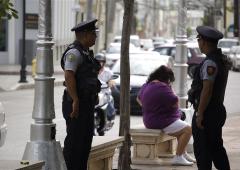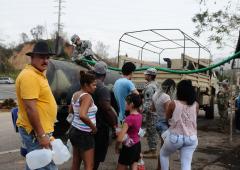Articles by: Marisol LeBrón
The ongoing protests in Puerto Rico are not just about profane chat messages—they are a response to a broader context of violence, degradation, and exploitation.
Even as a dwindling police force in Puerto Rico raises concerns over increasing violence, marginalized communities better served by alternative methods of violence and crime reduction are still vulnerable to state violence.
How can the history of policing in Puerto Rico deepen understandings of race, class, and colonialism in Puerto Rico—and what can it tell us in the aftermath of Hurricane Maria?
How reconsidering the history of policing in Puerto Rico complicates our understandings of the island's colonial relationship with the United States
The political crisis currently unfolding in Guatemala reads like the script of a Hollywood summer blockbuster. The Economist even quipped that it was like something out of Gabriel García Márquez’s novella Chronicle of a Death Foretold. But this is far from magical realism; in fact, it was the virtual reality of interactive networking websites – collectively labeled by some "Web 2.0" – that may have brought a presidency to its knees.
In an attempt to deter Mexican immigrants from crossing the border, the Border Patrol has released a music album titled, "Migracorridos." The corrido is a genre of Mexican folk ballads popular in the border region that frequently celebrates the exploits of outlaws and rebels. But like past campaigns, the Border Patrol's new musical initiative fails to address issues of safety and human rights along the U.S.-Mexico border.
The Prop 8 fallout shows how much work remains to be done to connect the LGBT rights movement with other struggles for social justice. Unfortunately, it may have taken the brutal murder of Ecuadoran immigrant Jose Oswaldo Sucuzhañay to highlight the invisibility of queer people of color – particularly queer immigrants – in LGBT rights discourse. His murder will hopefully provide an impetus for coalition building.
When Barack Obama clinched the presidency, pundits immediately began claiming the United States was on its way toward becoming a "post-racial" or "color-blind" society. But Latin America shows how claims of an emerging "racial democracy" easily coexist with mass discrimination and racism. Until racial hierarchies are systematically dismantled, myths of racial democracy will continue to mask and perpetuate injustice—both in Latin America and the United States.
 |
Reggaetón made its electoral debut this year. First, Daddy Yankee turned heads when he publicly endorsed Republican presidential candidate John McCain. Barack Obama followed suit highlighting reggaetoneros support for the Democratic ticket in videos. But it is in Puerto Rico that reggaetón is making the largest political waves. Although dismissed by some as apolitical party music, this electoral season confirms reggaetón's politicization. What that means, exactly, depends on who is doing the politicking.



